12 August 2025
8 minutes read
AWA GRE Issue Essay Examples: GRE Sample Essays for GRE Analytical Writing Section for Indian Students
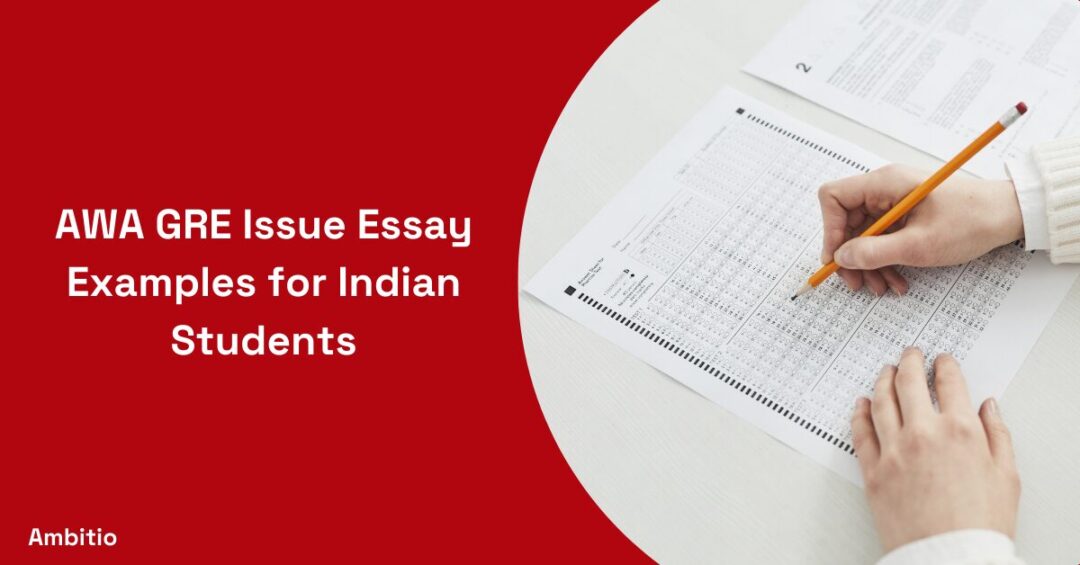
Key Takeaways
- GRE issue essay examples help test-takers understand effective argument structure, logical reasoning, and persuasive writing strategies for high scores.
- GRE issue essay examples provide clear models on how to develop a position with evidence, counterarguments, and coherent flow.
- GRE issue essay examples are valuable for mastering time management, topic analysis, and organized essay composition during the exam.
The Graduate Record Examination (GRE exam) is an assessment for graduate school programs in the United States and in other English language countries. One of the most difficult parts of the GRE is the GRE analytical writing section, which has two parts: the issue task and the argument task.
In this blog post, we are going to focus on the issue task and provide samples of GRE AWA issue essays, tips, and strategies to help you crush the GRE analytical writing section.
GRE Analytical Writing Section (GRE AWA)
The analytical writing section is the first part of the GRE and will measure your analytical writing and critical thinking skills. The section consists of two 30 minute tasks; an ‘Analyze an Issue’ task and an ‘Analyze an Argument’ task.
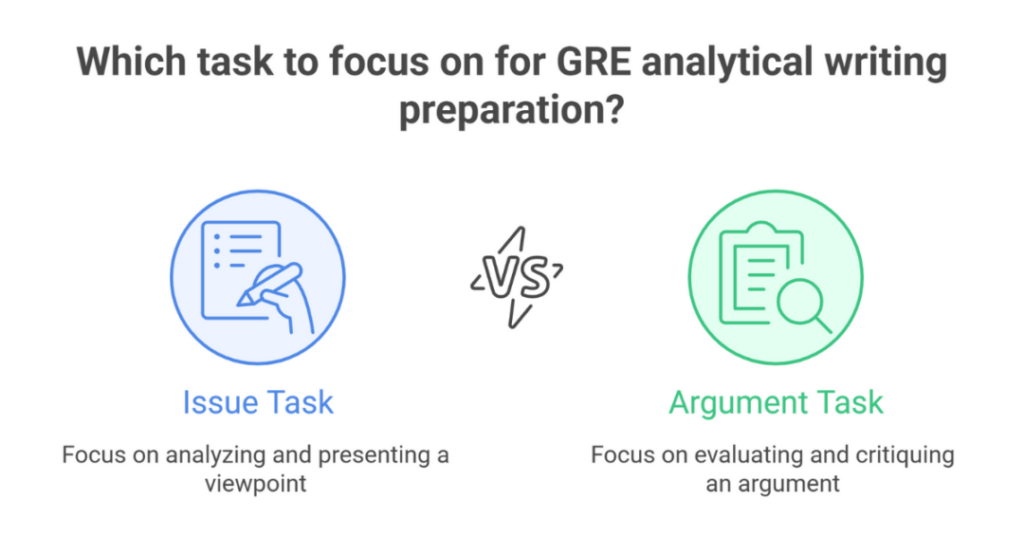
In the issue task, you will be given a statement on a general issue, and you will have to write a response in which you discuss your view of the issue. To support your position you will need to provide reasons and examples. Your essay, the clarity and logic used in your response, and your writing skills will all contribute to your GRE AWA score.
GRE Essay: Preparing for the GRE Issue Essay and Argument Essay
The issue essay simply requires you to take a position on an issue and support that position with reasons and examples. It is good practice to write essays on various topics to improve your writing skills and familiarize yourself with the types of topics that can appear and will appear in the actual GRE tests.
Analyzing the Prompt
The first thing you will need to do to prepare for the issue essay is analyze the prompt. The prompt will give you a statement and then ask you for the extent to which you agree or disagree with the statement. It is critical that you read the prompt carefully, understand the prompt and identify the issue that you will need to address in the essay.
Planning Your Response
After you have done analyze the prompt ,you will need to plan your response. Begin by deciding upon your position on the issue. Do you agree or disagree with the statement? To what extent do you agree or disagree? Once you have decided on your position, think about the reasons for your position and the examples that could be used to support your reasons.
Writing the Essay
When you write your essay, begin with an introduction in which you have a clear and strong position on the issue and a very brief outline of the reasons for your position. Go into the body of the essay with your reasons and provide examples of your position.
Make sure to address the most effective reasons and examples that could be used against your position. Finally, conclude by summarizing your position and reasons for your position.
GRE Essay Examples: GRE Sample Essay / GRE Argument Essay for Indian Students
Here are some sample issue essay topics and sample responses to help you prepare for the GRE analytical writing section.
Sample Issue Essay:
Prompt: “It is better to work quickly and take the chance of making mistakes than to work slowly and be certain that everything is the way it should be.”
Response:
Introduction: In today’s fast-paced world, there are often trade-offs between speed and accuracy. While I agree it is important to work quickly to meet deadlines and be competitive, it is also important to make sure the work is high quality and accurate.
I partially agree that it is better to work quickly and take the chance of making mistakes than to work slowly and be certain that everything is correct. While speed is important in some situations, accuracy is also important and we need to balance both speed and accuracy.
Body: On one hand, speed is critical in many circumstances. In the fast-paced and competitive world of business, firms often operate under tight timelines and must also respond quickly to changing market conditions.
When looking at speed, the benefits usually include increased levels of productivity, improved channels of decision making, and a competitive advantage when implementing strategy. And, in some circumstances, it may be beneficial to decide quickly, though not perfectly, to avoid waiting too long and miss the opportunity.
On the other hand, there is a certain amount of importance in producing high quality work, especially if you want to minimize errors. Additionally, errors can be quite costly in terms of wasted time, wasted materials, and lost reputation. Lastly, in certain fields, healthcare and aviation for example, errors can carry life or death consequences.
Conclusion: In summary, although producing work quickly might be desirable in some situations, appropriate time should still be taken to ensure quality work with minimal errors. There is likely to be a balance between speed and accuracy that should be considered, and ultimately should consider the potential consequences of an error.
In the end, it is likely that most of these situations will depend on the circumstances and what the consequences will be of error.
Tips for Analyzing an Issue, Sample Issue Essay Topics and Writing a High-Scoring GRE Issue Essay
When answering, you should explain how these considerations shape your statement and explain your reasoning for the position, while also exploring ways in which the statement might or might not hold in different contexts.
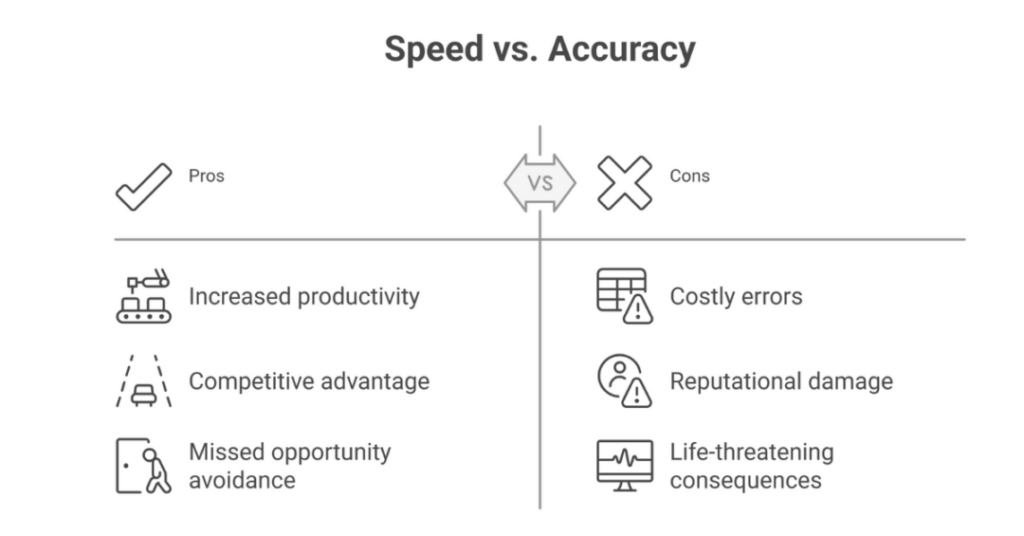
These tips apply to every other test out there including IELTS, TOEFL, GMAT, SAT and ACT.
While writing an issue essay, always keep the following things in mind:
- Analyze the Prompt: Make sure you understand the prompt and the issue it presents. Identify the key issues that need to be addressed in your essay.
- Plan Your Response: Decide on your position on the issue and think about the reasons for your position and the examples that could be used to support your reasoning.
- Writing a Clear and Logical Response: Begin with an introduction that clearly states your view of the issue along with a brief description of your reasons for your view. In the body of the essay, describe your reasons and include examples to illustrate your view. Also, include the most powerful reasons and examples that could be used to refute your view. Finally, summarize in the conclusion your view and reasons for your view.
- Practice, Practice, Practice: Practice writing essays about different topics to improve your ability to write essays quickly and to become familiar with the kinds of topics that may appear on the actual GRE test.
GRE Score Tips: GRE Writing Issue Task, Prompts and Essay Sample
Knowing the criteria on which your essay will be rated makes it much easier to write a high-scoring essay.
ETS, the organization that administers the GRE exam, rates the issue essay on four criteria:
- Articulation of Ideas: This criterion measures the fluency and clarity with which you articulate your ideas. Your essay should exhibit coherency to have a clear and logical expression of ideas.
- Development and Support: This criterion measures the examples and reasons you incorporate to support your stance on the issue. Your reasons should be well developed, and your examples relevant and convincing.
- Analytical Writing Skills: This criterion measures your thinking about the issue, whether you considered more than one perspective, and whether you developed a reasoned and thoughtful essay response.
- Control of Language: This criterion measures the writer’s use of language, including terminology, sentence patterns, and grammatical correctness.
To score high on the GRE test issue essay, ensure that you meet all of these criteria in your essay.
How to Nail the GRE Analytical Writing Section by Developing a Strong Thesis Statement?
Your thesis personal statement, statement of purpose, LOR and resume are some of the most important parts of your essay. It should clearly state your position on the issue and provide a brief overview of the reasons for your position.
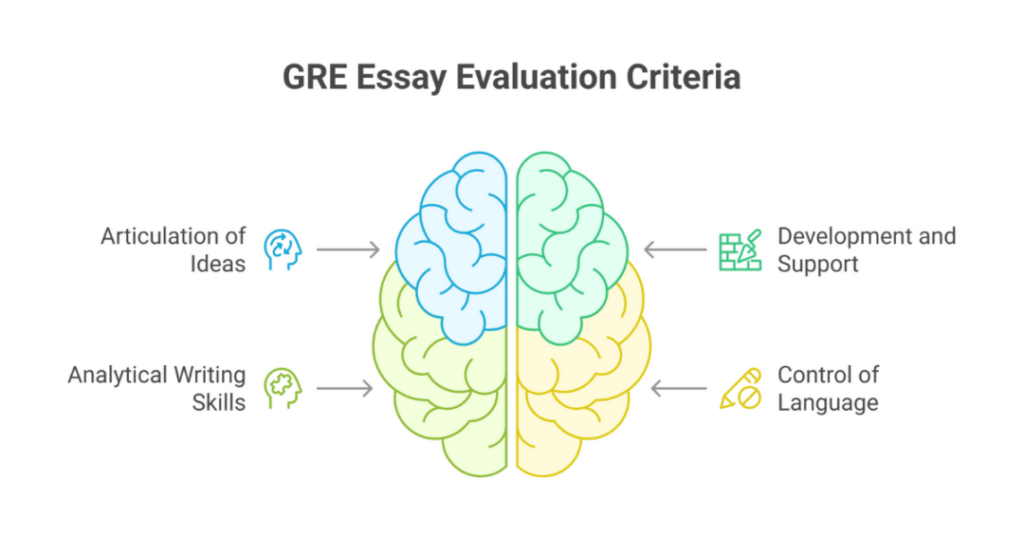
Your thesis statement should be specific and debatable, and it should provide a roadmap for your reader. Here are some tips for developing a strong thesis statement:
- Take a Clear Position: Your thesis statement should clearly state your position on the issue. Avoid vague or neutral statements that do not take a clear position.
- Be Specific: Your thesis statement should be specific and focused. Avoid broad or general statements that do not clearly articulate your position.
- Provide a Roadmap: Your thesis statement should provide a brief overview of the main points that you will discuss in your essay. This will help your reader understand the structure of your essay and the main ideas that you will be discussing.
Addressing Opposing Views in GRE Essay Topics
It is important to address opposing views in your essay. This shows that you have considered different perspectives on the issue and helps to strengthen your argument.
Here are some tips for addressing opposing views in your essay:
- Be Respectful: Acknowledge the validity of opposing views, even if you do not agree with them. Avoid dismissive or derogatory language.
- Be Fair: Present opposing views accurately and fairly. Do not misrepresent or distort opposing views to make your own argument seem stronger.
- Provide a Counterargument: After presenting an opposing view, provide a counterargument that explains why you do not agree with that view and why your position is more persuasive.
Using Evidence Effectively According to Different Types of Topics
Using evidence effectively is crucial for writing a persuasive essay. Your evidence should be relevant, compelling, and should directly support your thesis statement.
Here are some tips for using evidence effectively in your essay:
- Be Specific: Provide specific examples and details to support your thesis statement. Avoid vague or general statements that do not directly support your argument.
- Be Relevant: Make sure that the evidence you provide is directly relevant to your thesis statement and the main points of your essay.
- Be Persuasive: Use compelling evidence that persuades your reader to accept your position on the issue. This could include facts, statistics, anecdotes, or expert opinions.
How to Craft a Strong Conclusion?
Your conclusion is the final opportunity to persuade your reader to accept your position on the issue. It should summarize your main points, restate your thesis in a new way, and provide a closing thought that leaves a lasting impression on your reader.
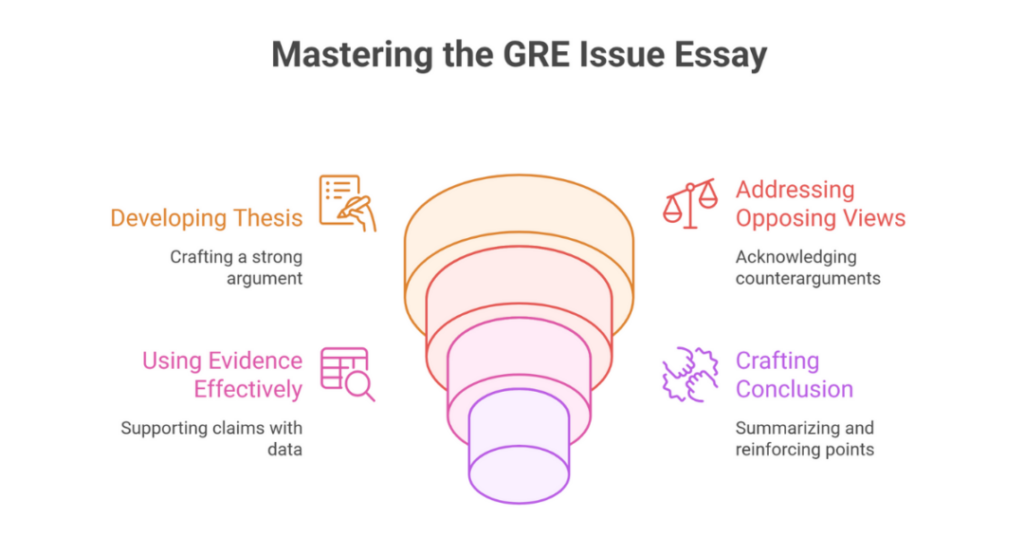
Here are some tips for crafting a strong conclusion:
- Summarize Your Main Points: Briefly summarize the main points of your essay. This helps to reinforce your argument and reminds your reader of the key reasons for your position.
- Restate Your Thesis: Restate your thesis in a new way. This helps to reinforce your argument and provides a sense of closure to your essay.
- Provide a Closing Thought: End your essay with a closing thought that leaves a lasting impression on your reader. This could be a call to action, a prediction about the future, or a final insight about the issue.
- Revise Your Essay: After writing your essay, take some time to revise it. Check the essay prompt and writing sample for any grammatical or spelling errors, and make sure that your ideas are clearly and logically presented.
Conclusion
The GRE issue essay is an important part of the GRE analytical writing section. By understanding the scoring criteria, developing a strong thesis statement, addressing opposing views, using evidence effectively, and crafting a strong conclusion, you can write a good GRE issue essay.
Remember to practice writing entire essays on various topics to develop your writing skills and to familiarize yourself with the types of topics that may appear in the actual GRE exam.
With practice and preparation with Ambitio, you can nail the GRE prep for analytical writing section and achieve a high score.
FAQs
What are GRE issue essay examples and why are they important?
GRE issue essay examples are sample responses to the “Analyze an Issue” task in the GRE Analytical Writing section. GRE issue essay examples help you learn effective structure, logical development, and persuasive writing. By studying GRE issue essay examples, test-takers can improve both strategy and execution.
How can GRE issue essay examples improve my writing?
GRE issue essay examples show how to present a clear thesis, support it with strong evidence, and address opposing viewpoints. By analyzing GRE issue essay examples, students can identify patterns of effective reasoning. Practicing with GRE issue essay examples also strengthens time management skills.
Where can I find authentic GRE issue essay examples?
Authentic GRE issue essay examples can be found on the ETS official website, in GRE prep books, and through reputable online resources. Studying GRE issue essay examples from reliable sources ensures you learn correct formatting. Consistent review of GRE issue essay examples builds familiarity with diverse prompts.
Do GRE issue essay examples cover all possible topics?
No, GRE issue essay examples do not cover every possible prompt, but they offer representative samples across categories. Reviewing various GRE issue essay examples helps you adapt to different themes. Combining GRE issue essay examples with practice essays enhances topic flexibility.
How should I study GRE issue essay examples effectively?
To study GRE issue essay examples effectively, read each example critically, outline its structure, and note its persuasive techniques. Then, compare multiple GRE issue essay examples to identify common strategies. Finally, write your own essay modeled after successful GRE issue essay examples.
Are GRE issue essay examples useful for beginners?
Yes, GRE issue essay examples are especially useful for beginners unfamiliar with the exam’s writing style. Beginners can learn the introduction-body-conclusion format from GRE issue essay examples. Practicing with GRE issue essay examples helps beginners quickly adapt to GRE requirements.
How many GRE issue essay examples should I review before the test?
It is recommended to review at least 10–15 GRE issue essay examples before test day. Studying multiple GRE issue essay examples exposes you to different approaches. Reviewing GRE issue essay examples also reinforces your understanding of what earns high scores.

You can study at top universities worldwide!
Get expert tips and tricks to get into top universities with a free expert session.
Book Your Free 30-Minute Session Now! Book a call now




























